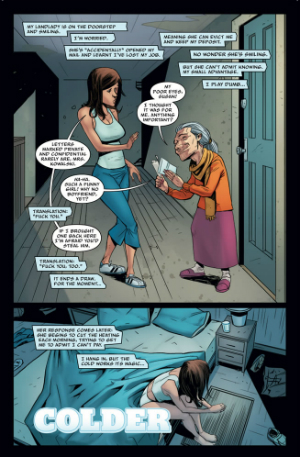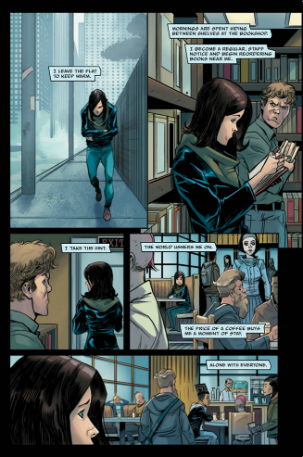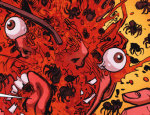‘State of the Small Press Nation’ was the umbrella title for Broken Frontier’s ground-breaking series of reports last year on the UK’s rapidly expanding self-publishing world and the challenges it faced going forwards. Micropublishers, small pressers, event organisers, printers and industry commentators all contributed to give their thoughts on the scene from a variety of viewpoints and perspectives. Subjects discussed included whether the growing number of UK shows was sustainable, if creative output was matching audience size, how to reach non-traditional audiences, and how to build up a profile. You can browse the full archive of articles here.
This week ‘State of the Small Press Nation’ returns to BF as a semi-regular series of curated guest blogs from some of those best placed to talk about the trials and triumphs of publishing your own comics. We begin today with John-Paul Kamath – a creator with a remarkable decade of self-publishing experience with his London Horror Comic title and its sibling Graveyard Orbit – who gives his thoughts below on ten years of LHC, self-motivation, and maintaining the balance between creating and promoting…
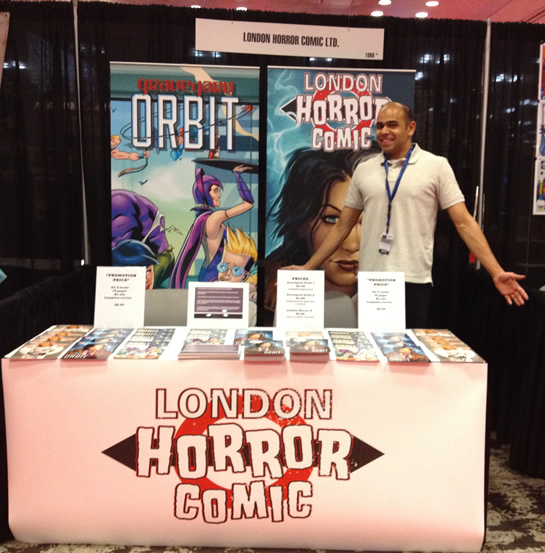
How do you meaningfully continue with your small press book after a couple of years? Is your work evolving or are you telling the same story with each new issue? How do you balance your time between creating and selling?
There are lots of articles on how to get started in UK small press comics but there’s little available light on how someone, who’s say got their first book or couple of books out, meaningfully continues in today’s UK small press scene.
“Meaningfully continues” is awfully subjective and slightly peppered with pretentiousness, but it’s these slightly existential “what’s-it-all-about-who-am-I-creating-for?”-style questions that I’ve had to work through over my ten-year journey of publishing London Horror Comic (specifically around 2am, when I’m not sure whether it’s the cheese I ate or genuine creator angst that’s keeping me up).
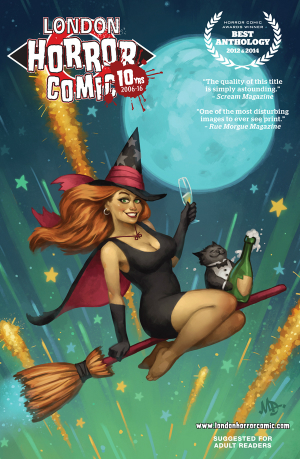 Rather than being an exercise in armchair punditry, answering these questions has left me with an approach of sorts that has helped me overcome the motivational obstacles that would have prevented me knocking out the next issue. It’s my thoughts around this that I share here.
Rather than being an exercise in armchair punditry, answering these questions has left me with an approach of sorts that has helped me overcome the motivational obstacles that would have prevented me knocking out the next issue. It’s my thoughts around this that I share here.
For me, developing an approach to solving the softer issues around being a creator acts as a sort of mental piece of driftwood I can cling to and… I don’t know… doggy paddle my way to shore and to my next convention appearance.
What’s more, if we’re to build a UK small press scene that thrives in the long term, we need creators that can sustain their motivations in the long run and share their approaches on how to navigate the inevitable and mostly intangible bumps in the road.
While the above probably best happens over a pint with like-minded colleagues, for a hermit like me it’s more convenient to simply Google “How to solve UK small press creator angst?” and hope something pops up.
So, with my terms defined and apologies made upfront, here are the top three challenges I’ve faced and my advice for dealing with them:
#1 You’ve published an Eisner-award winner and no one’s noticed
You wear your heart on your sleeve when you self-publish. You have to. No one is going to care more about your work than you will. You’ve published something that’s important to you rather than the superhero comic that’s relying on 18 variant covers to sell. You’ve been to your first convention and found…
People don’t care about your work as much as you do.

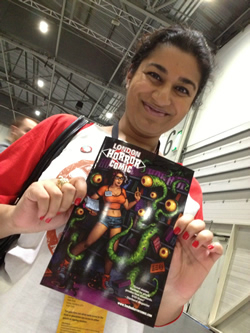
Righteous indignation builds and you become very conscious that your once noble motivations of becoming a small press creator are quickly souring to fuel an ‘origin of’ story of some real world super-villain.
The paradox of having successfully self-published is that it takes huge personal reserves that can never be fully rendered by the ink and paper. The blood, sweat and tears stay off the page but are always at the forefront of your mind.
 An early mistake I made when I began self-publishing was to think that the efforts I’d made in producing the book made a weird informal contract between me and the universe that guaranteed readers appreciate the effort I’d put in in addition to the work itself.
An early mistake I made when I began self-publishing was to think that the efforts I’d made in producing the book made a weird informal contract between me and the universe that guaranteed readers appreciate the effort I’d put in in addition to the work itself.
You have to learn to detach the “you” in “you” from the “you” in your comic once you’re putting it out there. Take things super personally when you’re putting the book together by all means. But when it comes to taking your book to market, people’s interest in your work or lack thereof is more about how good a match your book is with their tastes rather than a dismissal of your efforts and you as a person (yes, even if you’ve published an autobiographical comic diary).
How your work is received is beyond your control even though getting your book made is entirely within your control.
To separate the work itself from you as a person is easier said than done. But doing so keeps you sane in the long run.
#2 You’re torn between creating your book and selling your book
The thrill of small press publishing is that you can control what you produce and when.
You’re not relying on people saying no or yes. You’re not asking for permission to create. You have your own resources and if you want to write and draw a comic nothing is stopping you.
At the same time, you also have an obligation to get your book out there; to put your work in the hands of readers. Balancing the need to sell and the need to create leads to the problem of when you’re doing one, you always feel it’s at the expense of the other.
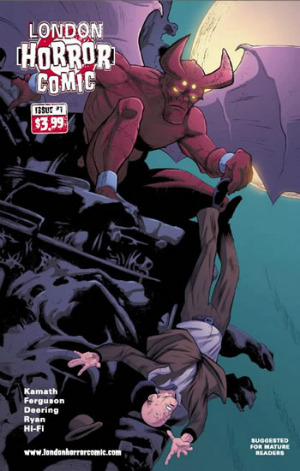 Maintaining an online presence across things like Facebook and Twitter exacerbate this supposed need.
Maintaining an online presence across things like Facebook and Twitter exacerbate this supposed need.
While it’s great there are so many UK conventions now, the self-imposed obligation of needing to be seen at every one so people don’t forget you can create a source of real tension.
What’s more, it can kind of screw with your natural flow of how fast you should producing work; a convention date rather than a genuine inspiration can suddenly become the overriding impetus to publish a book.
When I began the convention circuit I attacked appearances aggressively and then gradually culled the number of appearances based on a couple of things.
Firstly, there are conventions you can do exclusively for high volume single-instance sales (for example, your MCMs) or there are smaller local conventions you can do which build long-term readers for the book (for example, Leamington Spa Comic Con).
It’s important that over time you develop an understanding of the type of attention your book needs and where your work is likely to resonate more, as it’s this knowledge that will make you more comfortable with saying yes or no to the conventions that present themselves.
Secondly, and I think this is a far more important point; you should do conventions you actually enjoy. Exhibiting for days in a row is exhausting but a quality crowd and set of conversations can actually lend you energy.
For the moment I operate on a “one-year on creating the book, one-year on promoting the book” rhythm. This is the rhythm that works for me and I’m not hung up about not being seen in places as I once was.
What’s more, I’ve found that even through the gaps between me publishing books are about a year long, because I always produce them yearly, people know to look out for it.
It’s the regularity you publish rather than the frequency that maintains interest in your book.
Find the balance that works for you.
#3 You’re worried you’re playing it safe
I’m paraphrasing Alan Moore here but I think his advice about creating a piece of work which runs contrary to people’s expectations of what they expect you to create is the most valuable for staying fresh and keeping things interesting.
As a small press creator you do wear your heart on your sleeve, but you also wear your reputation on it, too.
If you’re a creator working on a big-name publisher book and it isn’t what the audience wants it’s more likely the publisher, the title or even the character itself is likely to take the flack.
But if you create a small press book it’s only you in the firing line.
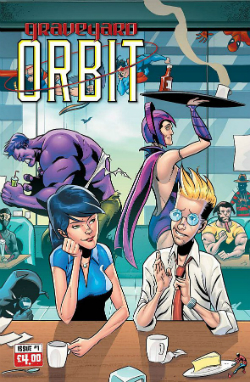 If you’ve spent a couple of years building a reputation for producing a certain type of work it can appear too risky doing anything else.
If you’ve spent a couple of years building a reputation for producing a certain type of work it can appear too risky doing anything else.
Do you dare risk losing whatever readership you have in an instance in the pursuit of trying something new?
Using my own experience as an example, when I began London Horror Comic it became known as much for its humour as its horror. This was a calculated move and was used as a way of differentiating the book and indeed my style.
But a couple of pertinent reviews pointed that maybe the scale was tipping too far to the humour and away from the horror. As a challenge to myself and to address this criticism, I threw away the crutch of humour that had supported a lot of my stories and restricted their remit to only disturbing readers.
The result was that I produced one of my best-received stories to date. A couple of readers were disappointed that the humour was lost, but creatively, knowing I could switch between light and dark should I choose to was a source of great confidence and opened up new possibilities for the types of stories I could write.
And looking back on the ten years I have been self-publishing, the reason I got started was ultimately one of self-sufficiency and autonomy. When you choose to go it alone you’re opening yourself up to a range of experiences that most people will never have to have.
The fact you work through these issues as you create is a sign that you’re maturing, not just as a creator, but also as a person. And while I might not win an Eisner or ever be fully comfortable with my lot, if by going through the process of self-publishing I become better as a person, I look forward to the next 10 years… as should you.
The print version of London Horror Comic #7 will be available to buy online worldwide at www.londonhorrorcomic.com from October 31st, at Thought Bubble Comic Festival UK (5-6 Nov) – New Dock Hall, Table 178 and Orbital Comics, London.
For regular updates on all things small press follow Andy Oliver on Twitter here.





